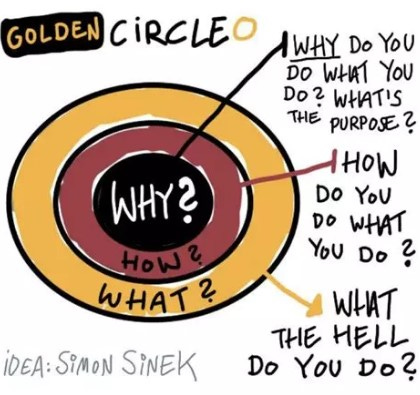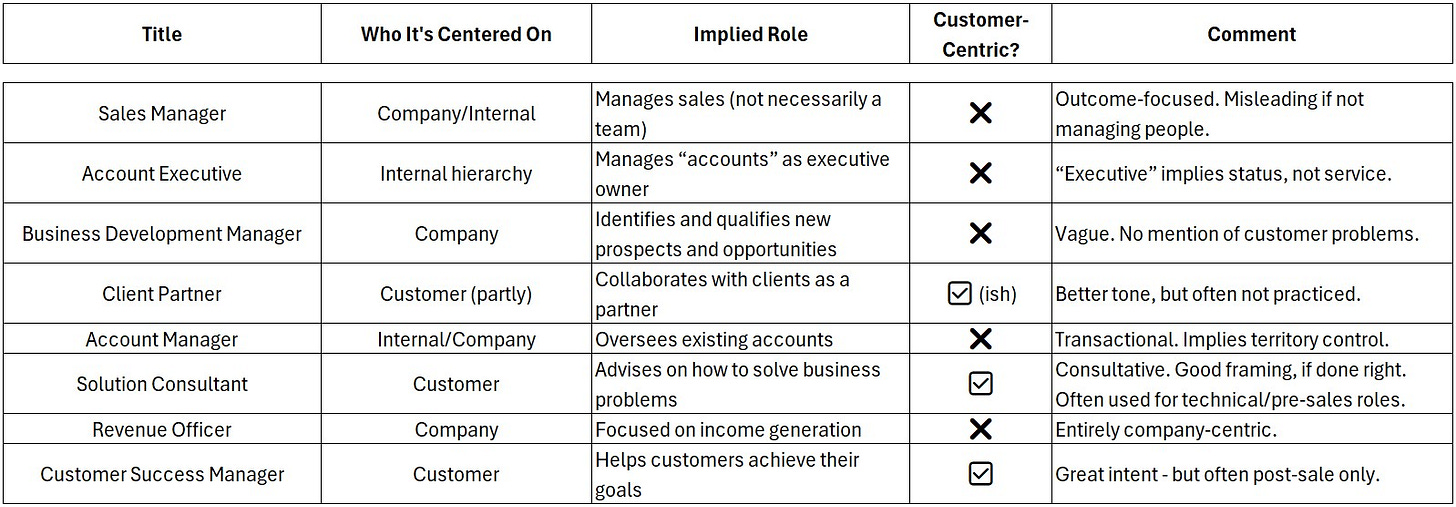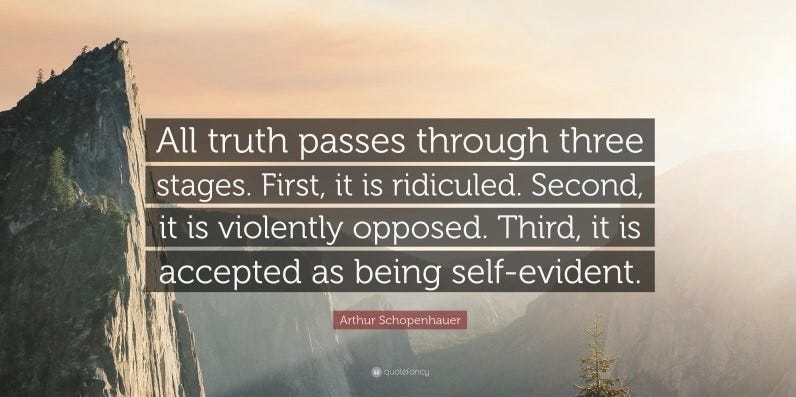If Simon Sinek Were in Charge of B2B Job Titles…
If Simon Sinek ran your sales department, your job titles would look very different - and your customers might trust you more because of it.
Because when the title doesn’t reflect the mission, it misguides both internal behavior and customer perception.
Too often, we define roles by their outcomes rather than their purpose. In the case of “Sales,” that creates a disconnect: between what top performers actually do, how they’re perceived by customers, and how the organization supports them.
It’s time we reframe the role of a modern B2B seller. Let’s start with the Golden Circle.
Simon Sinek - Golden Circle
Start With Why: What Are Reps Really Here For?
At their core, the best sales professionals (Reps) don’t see themselves as Sellers. They see themselves as partners, guides, and trusted navigators helping customers make smart, often complex decisions.
Importantly, this isn’t just how top Reps view themselves - it’s also how companies often describe the role in job descriptions. Leadership asks for strategic advisors, trusted consultants, and relationship builders. But when everything from KPIs to compensation still screams “close the deal,” that deeper purpose gets buried under pressure.
Their “Why” is simple but powerful:
“I help customers solve meaningful problems and drive better outcomes.”
That’s not a soft rebranding - it’s a recognition of what top Reps actually do when they succeed. They don’t just convince. They clarify, educate, challenge, and orchestrate. They create value before any contract is signed.
The How: Trust-Building and Problem-Solving
If that’s the “Why”, then what’s the “How”?
Reps who consistently outperform are not relying on outdated scripts or charm. They’re doing the hard work of:
Building credibility and trust over time
Mapping stakeholder ecosystems
Translating technical complexity into business relevance
Asking the uncomfortable questions
Guiding customers through change, risk, and ambiguity
In short: they sell through expertise, not pressure. Their "How" is built on consultative fluency and customer empathy, not a sales playbook written in 2012.
The What: Yes, It’s Still Called Selling… for Now
So what’s the “What” in this model?
Selling.
The proposals. The pricing. The negotiations. The close.
That’s the visible outcome of the work - but it’s the tip of the iceberg. When we call someone a “Sales Manager,” we reduce the entire profession to that final step. It’s like calling a doctor a “prescription writer.” Or calling an architect a “blueprint drawer.” Or an attorney a “contract reviewer.” Or a chef a “plate filler.”
Technically correct - but completely missing the scope, skill, and value behind the title.
We don’t reduce professionals to their final output - so why do we do it in sales?
And yet, when the title is all about the close, we risk sending the wrong signal - to our customers, who are already wary of being sold to, and to our colleagues, who may not understand the strategic role sales plays upstream.
The Labels May Have Evolved - But Has the Mindset?
In many industries, especially in tech and B2B services, you won’t often see “Salesperson” on a business card anymore. But you will see Sales Manager, Account Executive, or Business Development Manager - titles that sound more strategic or sophisticated. In some cases, they even hint at customer focus.
But let’s be honest: many of these changes were made for optics, not impact.
The labels evolved, but the underlying expectations and metrics often stayed the same. It's still about pipeline, velocity, and closing.
Some of the new titles were chosen with customer-centricity in mind. But unless the organization evolves alongside them - aligning strategy, training, and internal collaboration - these labels remain empty shells.
And there’s another layer to it: many titles are created with an internal lens. They serve to signal rank, territory, or positioning within the organizational chart. They’re ego-centric more than customer-centric - designed to clarify hierarchy, not customer value.
That’s the real opportunity.
A revised title can be the tip of the iceberg - a reflection of a broader cultural evolution. Or it can be the trigger that forces the company to re-examine how it defines, supports, and enables its go-to-market teams.
Because when we label roles more intentionally, we don’t just change what’s on the email signature. We change how reps are perceived, how they show up, and how the rest of the company aligns around them.
Common B2B Sales Titles and What They Signal
What’s the Alternative?
If titles shape perception, then what kind of title actually reflects the Rep’s real mission - to guide, support, and empower the customer in making the best decision?
A few possibilities worth considering:
Customer Advisor
Customer Advocate
Outcome Architect
Industry Expert
Solution Strategist
Value Consultant
Client Success Consultant
These might not roll off the tongue yet - but neither did "Customer Success" a few years ago. The goal isn’t just new jargon. It’s to signal purpose over quota, value over velocity, and collaboration over persuasion.
The Disconnect: Why This Matters to Leadership
Labels shape expectations - not just internally, but externally.
a/ From the customer’s point of view, the term “Sales” often raises red flags. It signals intent before value. It primes buyers to be on guard, to expect persuasion rather than partnership. In contrast, a more purposeful, insight-driven title sets a different tone from the start. It opens doors to conversations, not just pitches.
b/ Reps aren’t naïve. They know they’re judged on the numbers they bring in. That’s the job. But that doesn’t mean the title should only reflect the outcome. No one calls a pilot a “plane lander” or a surgeon a “suture closer.” The title reflects the mission, not just the final action. In sales, we’ve let the close define the identity - when it’s really just the result of everything else done right.
c/ For leadership, this isn’t just a language issue - it’s a signal to the entire organization. When the role is defined by its purpose - value creation, insight delivery, trust building - it changes how Marketing collaborates, how Product listens, how Finance prioritizes. Reframing the role helps re-align internal teams around the real customer journey, not just the transaction point.
A Modest Proposal: Let’s Lead With Purpose
We’re not suggesting you remove “Sales” from your org chart tomorrow.
But what if you started internally by reframing the narrative?
What if, in your next kickoff or onboarding, you said:
“You’re not here to sell. You’re here to help. If you help well, the sale will follow.”
What if job descriptions started with the “Why”?
What if compensation plans rewarded the how, not just the “What”?
And what if customers - hearing how you define the role - started to trust your Reps more, not less?
Final Thought
Words shape perception. Perception shapes behavior. Behavior drives results - and ultimately, behavior shapes culture (*).
If we keep calling the role “sales,” we’ll keep framing it in a way that misrepresents its purpose - to our customers, to our teams, and to the rest of the organization. But if we define it by its real value, we unlock better collaboration, stronger trust, and smarter go-to-market execution.
It’s time we stop letting the tail (the “What”) wag the dog (the “Why”).
And while we’re at it, why not take the role of Presales under the same scrutiny? Often seen as a supporting act, presales professionals are actually core to value creation -translating technical capabilities into business relevance, and building trust before the first signature. It’s time we apply the same clarity of purpose and intentional naming here too.
What you call your team says everything about how you see them. It’s time we name the role for what it really is: the customer’s most valuable ally.
(*) additional reading:
Navigating the tension between Culture and Strategy in Sales organizations
Aligning Culture with Strategy: why Culture fit, adaptability, and diversity matter...
www.linkedin.com/company/theb2bspecialist
#SalesLeadership #ModernSelling #CustomerCentricity #StartWithWhy #GoToMarketStrategy #SalesCulture #B2BSales #SalesLeadership #CustomerCentricity #SalesTransformation



